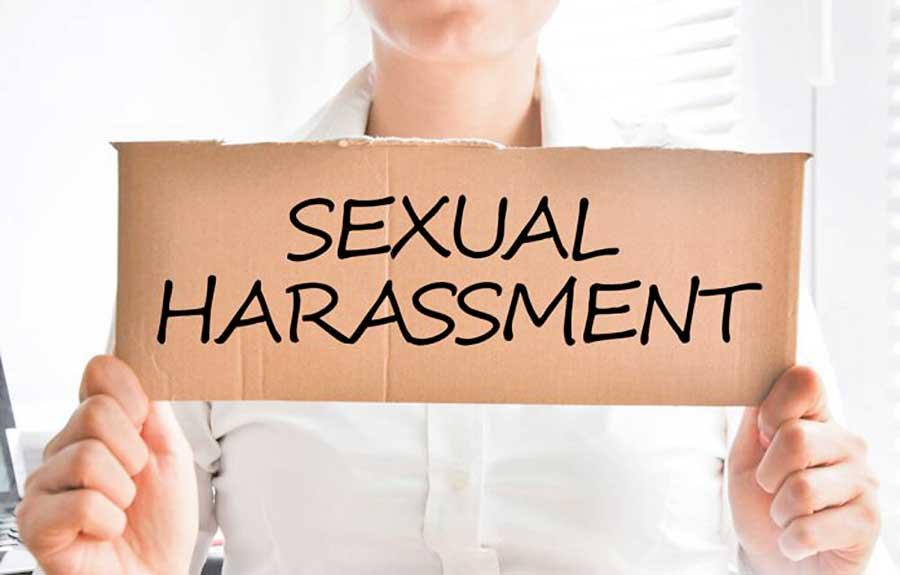26 Apr 2023 - {{hitsCtrl.values.hits}}

Allegations of sexual harassment made against top management by a national TV station presenter drew widespread criticism that such stations are at the mercy of political higher ups
No human with even the bare minimum awareness of media professionalism will step into a state-owned institution. If they do, they do so, with the understanding that they are there as political bots, nothing more
Two incidents last week defined the abysmal unprofessionalism plaguing Sri Lankan media. The publication of the images of a suicide and the allegations of sexual harassment made against top management by a presenter at a national TV station.
harassment made against top management by a presenter at a national TV station.
What is even more striking is that in both instances the institutions were state-owned. Or should we say funded by public money, but managed for the political expediency of whoever is in power.
During my recent training assignment in Colombo, it was clear that there were deep crevasses within the media community. Politicisation of institutes, even those privately owned was one of the biggest. It was one of the main roadblocks in the way of professionalism. There were politically powerful, professionally unsuitable characters in every news desk.
For decades the behemoth of state-owned media has created an unbelievably biased reporting narrative in Sri Lanka; one that favours the ruling party. Well before the dialogue on fake news became current, the state media in Sri Lanka was used and abused to pump out propaganda 24/7. It was the norm; it is the norm and it will be the norm. State media is state lies.
Heads at state media institutes, managers and the work crew are all those who side with whoever is in power. They are positioned there by them, to do their paymasters’ bidding without questioning. And they have no qualms or even any human decency about it. Otherwise, why would you reproduce a picture of someone’s deathbed?
This has nothing to do with journalistic professionalism or ethics, this is about rabid dogs let out to do an equally rabid political master’s bidding.
Heads at state media institutes, managers and the work crew are all those who side with whoever is in power. They are positioned there by them, to do their paymasters’ bidding without questioning. And they have no qualms or even any human decency about it
And these canines assume a sense of power by way of proximity to the political powers. The closer that proximity is, the more powerful these personalities are. Some of them would spend years in departments popularly known as Siberia when the political masters ended up in the dustbin. They would face up to the ignominy, still draw a pay cheque and reappear like dust mites from soiled linen on the return to power of the political masters. We have seen this over and over again in hues of green, blue, purple and red.
These political hatchet men and women have but one focus, keep the political masters happy and in doing that make themselves happy whichever way they can. And this is what is happening today.
Will this change? Very unlikely.
For it to change, public perception has to change that these institutions are not state- owned, they are public funded. They should be functioning as public service institutions and not as gutter press.
They also need to be yanked out of the control of political puppet masters. These institutions are not going to survive this way for long unless they keep going as massive drains on public funds.
Politicisation of institutions is an issue that is plaguing private media as well. That is why Sri Lankan media is so polarised. That is why most of the new media outlets that emerge are more extremists in their ideological stand. It is a reaction against decades of politicised reporting that has eroded public trust
But I am very sure that none of these will happen. These institutions will continue to go on as guesthouses for political pamphleteers. These will pretend they are media professionals; they are not. Never be fooled by this claim.
No human with even the bare minimum awareness of media professionalism will step into a state-owned institution. If they do, they do so, with the understanding that they are there as political bots, nothing more.
Politicisation of institutions is an issue that is plaguing private media as well. The ropes that trudge at the output may be a little less conspicuous, but they are there. They infest the body cooperate of any media. That is why Sri Lankan media is so polarised. That is why most of the new media outlets that emerge are more extremists in their ideological stand. It is a reaction against decades of politicised reporting that has eroded public trust.
Will these two incidents change anything within the media community? They have.
Even before these incidents, mid-level journalism was confronting these existential questions. The dialogues may not be heard in the management rooms, most certainly not in the chairperson’s office. But if they cared to listen to these are taking place.
Journalists are questioning the application of ethics, political favouritism, misogyny and yes, that gut feeling that the old has to make way for the new.
The old has to make way for the new. The new should not reflect the old. The new should take the firehose to the political dust mites.
I hope they do.
The writer is a journalism researcher and a PhD candidate. He can be contacted on [email protected]
04 Jan 2025 5 hours ago
04 Jan 2025 5 hours ago
04 Jan 2025 6 hours ago
04 Jan 2025 6 hours ago
04 Jan 2025 7 hours ago